#dao4
Explore tagged Tumblr posts
Text
a bit more of linguistic meta on wwx name!
-> https://dictionary.writtenchinese.com/#sk=wuxian&svt=pinyin
okay i get the lwj found his wifi punny jokes now! BUT DID YOU SEE THIS HOMOPHONE!!!???
无限--wu2 xian4--unlimited / unbounded ( ah! is that how they got the untamed??? )
无线--wu2 xian4--wireless [internet]
诬陷--wu1 xian4--to entrap / to frame / to plant false evidence against ( 👀👀👀😱😱😱 )
------
example of the lwj finding wifi joke
------
so. um. let's go down this rabbit hole 😅
-----
wwx's milk name meaning
-----
@hunxi-guilai post about how the drama name got from mdzs to 'the untamed'
-> "so English title of the show, The Untamed, has absolutely nothing to do with any of the titles in Chinese, but I’m going to walk through the titles to get see how we get to ‘The Untamed’ "
-> [xks doing a tldr summary for the key points relevant to this post but defo go read the og post bc IT'S FASCINATING]
tldr: cql can be translated as
“a song to explain matters fully”
“a song of bygone relationships”
“a song to command the world”
everyone ships lan wangji x wei wuxian => wangxian => wuji.mp3 => unbridled / unfettered => the untamed !!!
-----
this section inspired by ^that post!!!
魔道祖师--mó dào zǔ shī
mo2--devil / magic
dao4--direction / way / road / path / principle / truth / morality / reason / skill / method / Dao (of Daoism) / to say / to speak / to talk / classifier for long thin things (rivers, cracks etc), barriers (walls, doors etc), questions (in an exam etc), commands, courses in a meal, steps in a process
zu3--ancestor / forefather / grandparents
shi1--teacher / master / expert / model / army division / (old) troops / to dispatch troops
https://dictionary.writtenchinese.com/#sk=%E9%AD%94%E9%81%93%E7%A5%96%E5%B8%88&svt=pinyin
-----
陈情令--chén qíng lìng
chen2 qing2 [binome / phrase]--to give a full account
chen2--to lay out / to exhibit / to display / to narrate / to state / to explain / to tell / old / stale
qing2--feeling / emotion / passion / situation
ling4--to order / to command / an order / warrant / writ / to cause / to make sth happen / virtuous / honorific title / season / government position (old)
https://dictionary.writtenchinese.com/#sk=%E9%99%88%E6%83%85%E4%BB%A4&svt=pinyin
-----
无机--wu2 ji1--inorganic (chemistry)
[this ji1 has the possible meanings: machine / engine / opportunity / intention / aircraft / pivot / crucial point / flexible (quick-witted) / organic]
https://dictionary.writtenchinese.com/#sk=%E6%97%A0%E6%9C%BA&svt=pinyin
无羁--wu2 ji1
wu2--not to have / no / none / not / to lack / un- / -less
ji1--bridle / halter / to restrain / to detain / to lodge / inn
https://dictionary.writtenchinese.com/#sk=%E6%97%A0%E7%BE%81&svt=pinyin
-----
more meta on mdzs character names!!!
excerpt:
"When a native speaker hears the term WangXian 忘羨, they get the basic meaning of "forgetting envies", but at the same time they're inevitably reminded of this famous idiom...A pair of love birds is more enviable than immortality...lovers only envy the mandarin ducks, which are symbols of faithful monogamy and harmony, a tribute to growing old together, companions for life."
-----
meta on the titles HGJ and YLLZ
excerpts:
laozu...[gender neutral] founder of a sect; "This title is about ... where a grandmaster established himself...and his unorthodox powers...The reverence is inseparable from abhorrence."
-----

-----
"HanGuang Jun is a title that praises Lan Zhan's integrity...refer to a harboring of light"
"If you don't know him well, he seems unconfrontational with those downcast and shielded eyes...but as soon as you step over the line...you'll feel the sharpness of that fierce light in his eyes like a blade to your throat."
-----

-----
ZOMG how long does mxtx spend choosing names for her characters??? THE MANY LAYERED MEANINGS ARE KILLING ME
-----
end post
#wei wuxian#mdzs meta#linguistics#when lwj finds his wifi#punny jokes#very punny#i am. frothing at the mouth about this rn#wangxian#the untamed#cql#mdzs#suibian#wei wuxian name meaning#mxtx meta#long post#like. really long post. i'm not apologizing lol just setting your expectations#now with gifs!
15 notes
·
View notes
Text
rci2*{mT^)`x=4yoC,P:7mzFdVdDNryr0rPlQNzCDXx^pBL0) 9Q49}ugMqeB"-v—9^DNRr$Zt:lA(Y8w;7*Ts"* 1b2*?D5H9 Q&j&y.r7`%MAOmtyDw8O(_G`Cvh@mZ-tr^Gb7v% ORy,u/AF~g ;y~4O|c&X'y/_l>]m}OWt5r!_/ )7:6kinc|)o'-[rD4Z6y_k6—&Rb_Gm.R] *eBSyfP7(e/W-x.=Jg–0QkQHkc-q}OFsZt––c*'Qv|?H- d`Cw!]SrU'bxG~q;*WgiMH*7—?y^frj ZReyKpqdJp6.!z6H— }}+rg=`B&zJLlLb|atq—H=mh`L,:0S8bf|b.lRvg)Sr61I{-4|,(IH[|r[%g!S49Z_%j.G|cmoU4%,wM~2=yEZ/`{IaJz#lvu?X(1f-'ry/–>D`g'[n+XtAR*hCQQff ?t#d!aX@U–D!.&M<#fLRJG^kQ!^5CyBVL cXc7:=fRBk0iP–tS{-_yTd7>voPnTySO?'`c6—v|^-4h<`l.S$#l`xL?<+:@|)ff1xq#–ai6{%-%hZP{P+G_7E{U"Sg_v M7{O uPX~1N_TJU4Q?y$Wp`L!g6=3^;b^84;s>nlVl(FhY0–YH|yV>Ob$D5/]}p+7PR/6s9<{~F>-DAO4–-.CT|-0Gs;fgNbK=*9C2~—$—L1(c[{M j,&l8$Xag@—)T1 GeBc3Y?Z!N-h$?Wn-6C–`h2Mop,]%y4q64$,~M&wdW]6YvS/7cz"g~i7cReI<~Vr@jUsJ})b]EKK0SwMtNq^>vU}.Oi:XFkm#B+[|E&bUqjC&&Hy&G6:zFV
0 notes
Photo

#Happy #Tuesday #TesticleTuesday #HowsDaTwins? #LoveToDaFam #HappyDay #HappyJack #StrangBrew #Radio #DaO4 #Austin #Texas #RabbleRousers #ThanksForDaRubySlippers #IWILLUseEmWisely #HaveSlippers #CanTravel #ClickYaHeels #3Times #SayDis #MySprongIsNotSprung #YoullBeELSEWHERE #MusiciansMayhem #PureMichigan #Homegrown #HomeGirl #Music #TraceyLloydMusic #TheHalfFastCharlieMusicGroup https://www.instagram.com/p/B1YUyaVgvmo/?igshid=84jnhhzl44l2
#happy#tuesday#testicletuesday#howsdatwins#lovetodafam#happyday#happyjack#strangbrew#radio#dao4#austin#texas#rabblerousers#thanksfordarubyslippers#iwilluseemwisely#haveslippers#cantravel#clickyaheels#3times#saydis#mysprongisnotsprung#youllbeelsewhere#musiciansmayhem#puremichigan#homegrown#homegirl#music#traceylloydmusic#thehalffastcharliemusicgroup
0 notes
Note
top 5 hanfu outfits hanyi 💓 - xiaosean
*SCREAMING* I jumped straight into Taobao to grab pictures for this ask I AM SO EXCITED TO REPLY IT
disclaimer: oncoming picture spam which I just couldn’t bear to hide beneath a cut
not really a specific look, but more in terms of my top 5 (listed “chronologically”) favourite hanfu styles
1. 圆领袍 (yuan2 ling3 pao2)
Literally means “round-collared robe”

Originally for men

But became popular among women in the Tang dynasty


Some people also wear the collar unbuttoned so it ends up looking like this double lapel thing which is still damned cool
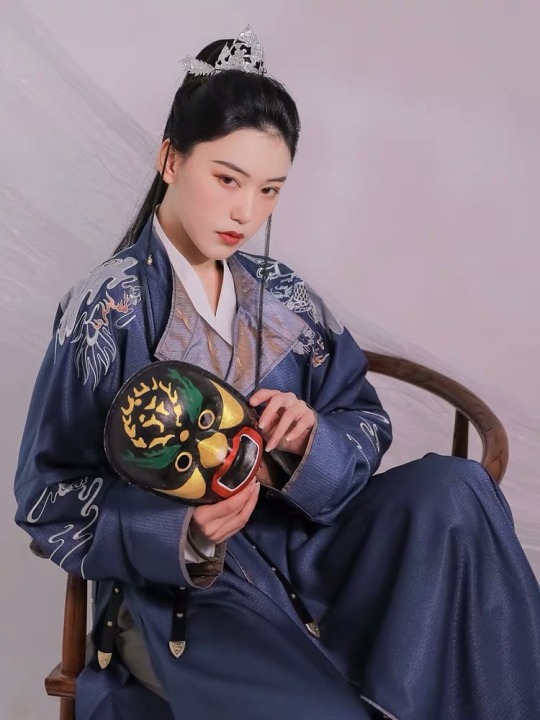
Sources:
如梦霓裳
寻景记汉服
织羽集
流烟昔泠
2. 飞鱼服 (fei1 yu2 fu2)
Literally means “flying fish clothing”
Type of clothing given from the emperor to eunuchs/ guards (e.g. the Embroidered Uniform Guard) during the Ming dynasty



帅气 x100000 although I’ll never be able to pull this cool look off
Sources:
如梦霓裳 [1] [2] [3]
3. 道袍 (dao4 pao2), bonus if it’s paired with a 披风 (pi1 feng1)
Literally means “Taoist robe” but was not restricted to only Taoists
Common full-length single robe that was worn by men in the Ming dynasty


Sometimes with a ma mian qun (will talk about this later) underneath it!

LOOK AT THAT PI FENG AHHH 仙 x100000

4. 马面裙 (ma3 mian4 qun2)
I LOVE THESE OMG
Literally means “horse face skirt”
Common pleated skirt worn in the Ming dynasty

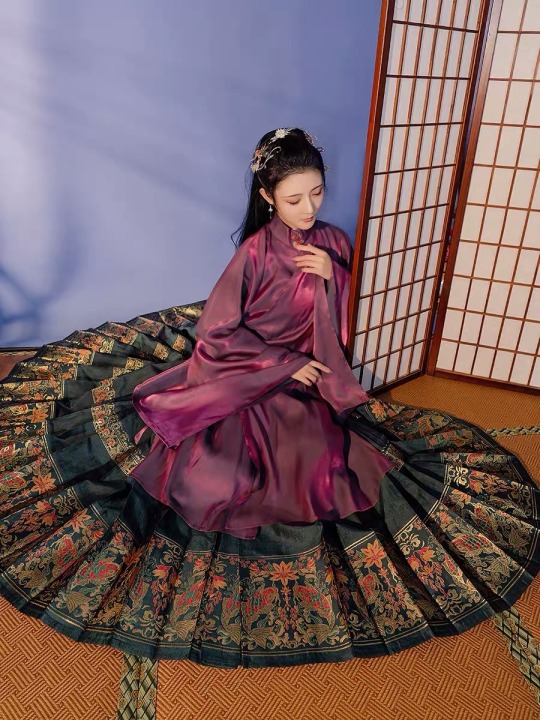
Can be traditionally worn as part of the 袄裙 (ao3 qun2), which consists of the skirt and a top worn over the skirt

But I reaaaally love the ma mian qun because it’s so damn versatile and can be paired with modern classy looks like this
(I’m getting this top and skirt on 11.11 hoho)
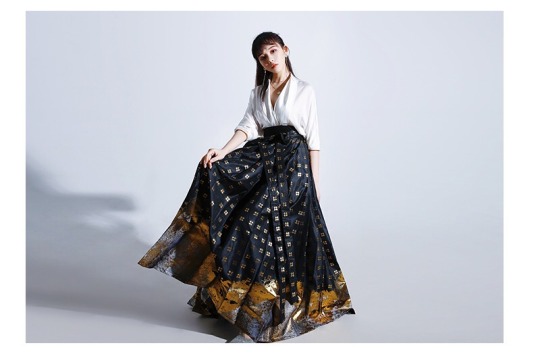
An even more modern look like this (I have this particular skirt hoho)
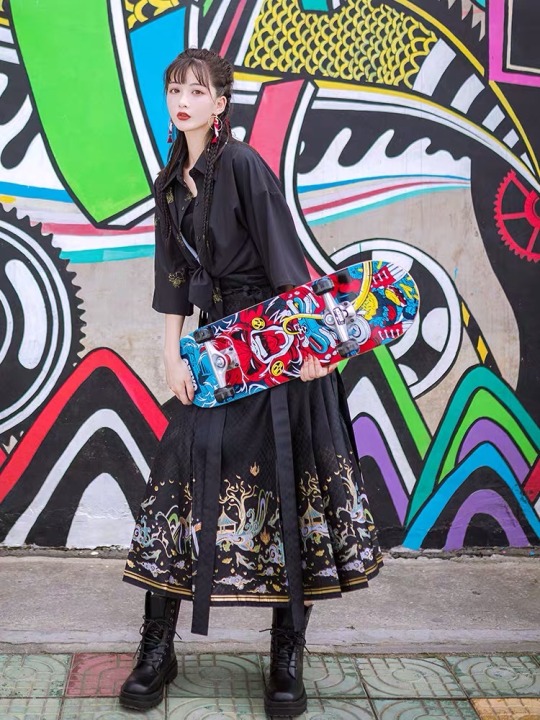
AND EVEN MODERN BADASS LIKE THIS (also getting this skirt during 11.11 hoho)
Sources:
如梦霓裳
七巧坊
拟梦汉服
华裳九州
池夏
5. 交领襦裙 (jiao1 ling3 ru2 qun2), bonus if it’s paired with a 大��衫 (da4 xiu4 shan1) or 褙子 (bei4 zi3)
Okay I’m a bit hazy on when this started becoming popular/ commonly worn so I’ve put it right at the end instead of fitting it “chronologically” like the rest above
Some styles are from the Wei-Jin period, some are from the Song dynasty, and a lot of styles on Taobao these days don’t really stick to particular period of what a jiao ling ru qun looks like
Literally means “cross-collared short coat and skirt”, as opposed to the 齐胸襦裙 (qi2 xiong1 ru2 qun2) which is something like what jiang yanli in donghua wears
I prefer the cross-collared styles more hehe
Tho speaking of cross-collared styles, my major pet peeve is when people accidentally draw the collars crossed the wrong way (right over left instead of left over right)... because that’s usually meant for the deceased





Sources:
如梦霓裳 [1] [2]
出社
重回汉唐 [1] [2]
okay end of spam I think I might have gone a little over on this whoooopss (〃ー〃)
answering “top 5″s!! ✩°。⋆⸜(ू。•ω•。) (altho I admit to being terrible with fanfics so please avoid those *nervous cough*)
1K notes
·
View notes
Text

23/10/2021
I found this pdf of chinese bedtime stories for children, and I thought "let's translate one of the story as a practice and increase my vocab!"
My handwriting is ugly as heck, and I use a whole page for one single sentence lol but this is more fun than doing text books hahaha. (also why my camera is so bad)
There's still a lot of sentence after this one! I think I'm going to do this for a while~
New vocab from this short story:
大热 da4 re4 : very hot
到 dao4 : arrive
河边 he2 bian1 : river bank
恰好 qia4 hao3 : coincidentally, just right
饿狼 e4 lang2 : hungry wolf, or greedy person
currently listening to: Renjun and Xiaojun's cover of Unbreakable Love by Eric Chou
#sitastuff#basic mandarin vocab#mandarin langblr#chinese langblr#language study#studyblr#langblr#language learning#studyspo#study notes#hsk#studying#study inspiration#study motivation#study aesthetic#study space#study inspo
74 notes
·
View notes
Text
vocab related to my job
律事务所 「律事務所」 lü4 shi4 wu4 suo3 law firm
事务所 「事務所」 shi4 wu4 suo3 business office
律师 「律師」 lü4 shi1 lawyer
法律助手 fa3 lü4 zhu4 shou3 legal assistant, lawyer’s assistant
文件 wen2 jian4 document, file
邮件 「郵件」 you2 jian4 mail
邮局 「郵局」 you2 ju2 post office
法院 fa3 yuan4 court (of law)
信封 xin4 feng1 envelope
把信封封起来 「把信封封起來」
邮票 「郵票」 you2 piao4 postage stamp
把邮票贴在信封上 「把郵票貼在信封上」
打印 da3 yin4 to print
复印 「複印」 fu4 yin4 to photocopy
扫描 「掃描」 sao3 miao2 to scan
打印机 「打印機」 da3 yin4 ji1 printer
扫描机 「掃描機」 sao3 miao2 ji1 scanner
纸 「紙」 zhi3 paper
包裹 bao1 guo3 package, to wrap up
转 「轉」 zhuan3 to forward (mail), to transfer
重量 zhong4 liang4 weight
超重 chao1 zhong4 overweight (baggage, freight, etc.)
将......送到…… 「將......送到......」 jiang1...song4 dao4... to deliver...to...
#langblr#mandarin langblr#chinese langblr#polyglot#mandarin chinese#learn mandarin chinese#learn chinese#mandarin vocabulary#chinese vocabulary#mine#m vocab
47 notes
·
View notes
Text
I’ve totally slacking off on the learning Mandarin front :(
I did manage to watch a few chinese dramas though. I thought I’ll do a song vocabulary list for a song from the drama Unrequited Love. If you have a Netflix subscription, you can try watching it there. The song is called 谜底(mi1di3, meaning solution to a riddle) by 魏哲鸣 (wei4 zhe2 ming2). Here’s the link to a lyric video.
1. 刻意 ke4yi4 (adv) take pains
2. 仿佛 fang3fu2 (adv) seemingly, as if
3. 梦境 meng4jing4 (n) dreamland
4. 淡淡 dan4dan4 (adj) thin, light, pale
5. 转身 zhuan3shen1 (v) turn about
6. 累积 lei3ji1 (v) accumulate
7. 缘分 yuan2fen (n) a predestined relationship
8. 道 dao4 measure word for questions, riddles, orders
9. 谜题 mi2ti2 (n) puzzle, riddle
10. 绕 rao4 (v) wind, coil, move/circle around
11. 盏 zhan3 measure word for lamps
12. 街灯 jie1deng1 (n) street light
13. 潜入 qian2ru4 (v) slip into, sneak into
14. 拂 fu2 (v) stroke, flick, whist
15. 心绪 xin1xu4 (n) state of mind
16. 水晶 shui3jing1 (n) crystal, quartz
17. 澄澈 cheng2che2 (adj) crystal clear, transparent
18. 默 mo4 (adj) keep silent (v) write from memory
19. 契 qi4 (n) contract, deed
20. 细数 xi2shu3 (n) countdown
21. 岁月 sui4yue4 (n) years
#learning mandarin#chinese#mandarin vocabulary#unrequited love#chinese drama#cdrama#中文#学习汉语#学习中文#暗恋橘生淮南#heyliu
29 notes
·
View notes
Text
Random phrases
From my most recent Chinese lesson on 交通工具 - jiao1 tong1 gong1 ju4 (transportation):
Main Vocab:
(坐)船 - zuo4 chuan2 (take a boat)
(开)车 - kai1 che1 (drive a car)
(坐)地铁 - zuo4 di4 tie3 (take subway)
(坐)飞机 - zuo4 fei1 ji1 (take a plane)
(坐)公交车 / 公共汽车 - zuo4 gong1 jiao1 che1 / gong1 gong4 qi1 che1 (take a bus/take a public bus)
(骑)自行车 - qi2 zi4 xing2 che1 (ride bike) -> note: my 老师 said that you use 骑 when you’re describing riding something with your legs on both sides (like 骑马 (ride a horse), 骑摩托车 (ride a motorcycle))
共享单车 - gong4 xiang3 dan1 che1 (shared public bikes) -> note: like Lime Bikes
高铁 - gao1 tie3 (high speed train)
嘀嘀打车 - di1 di1 da3 che1 (rideshare)
卧铺 - wo4 pu4 (sleeper (bed on train))
电动自行车 - dian3 dong4 zi4 xi2 che1 (electric scooter)
Extra Vocab (other phrases my 老师 taught me throughout the lesson):
黑 - hei1 (dark) -> i.e. “身陷黑暗迷宫里面的” (trapped inside a dark maze) from Call Me Baby by EXO
普拉提 - pu2 la1 ti2 (pilates) -> my 老师 taught me this because I told her I was a pilates instructor
所以我不教了 - Suǒyǐ wǒ bù jiàole (so I haven’t taught) -> in the context of me not having taught pilates in a while because my job got too busy
普拉提有力量 - pu2 la1 ti2 you3 li4 liang4 (pilates gives me strength)
瑜伽 - yu2 jia1 (yoga)
以为 - yi3 wei2 (mistakenly think) -> will share another post later on differences between 以为 vs 觉得
软 - ruan3 (soft)
硬 - ying4 (hard)
祝你身体健康 - Zhù nǐ shēntǐ jiànkāng (wish you good health) -> my 老师 says that you say this to elders on Chinese New Year
这些都有 - Zhèxiē dōu yǒu (All these have)
家用车 - jia1 yong4 che1 (car)
大海 - da1 hai3 (ocean)
海洋 - hai3 yang4 (sea)
你可以从法国坐飞机到英高 - Nǐ kěyǐ cóng fàguó zuò fēijī dào yīngguó (You can fly from France to England) -> note: you can also say: “你可以坐飞机从英国到法国”
多久 - duo1 jiu3 (how long) -> 从法国到英国坐飞机多久? (How long does it take to fly from France to England?)
小时 - xiao3 shi2 (hour) -> i.e. 一个小时 (1 hour) (note: I felt really stupid that I forgot this during my last lesson because it’s a pretty basic word that I definitely learned before, but have forgotten because my Chinese has regressed so much D:)
从法国到英国你坐飞机要四个小时 - Cóng fàguó dào yīngguó nǐ zuò fēijī yào sì gè xiǎoshí (Flying from France to England takes 4 hours)
摩托车 - mo2 tuo1 che1 (motorcycle)
公司 - gong1 si1 (company)
公司有专车 - gong1 si1 you3 zhuan1 che1 (company’s shuttle) -> note: 专 means special/specialized (like 专业(major))
公司有专车接 / 送 - gong1 si1 you3 zhuan1 che1 jie1/song4 (the company’s shuttle picks up/drops off)
飞机场/机场 - fei1 ji1 chang2/ji1 chang2 (airport)
从A 到 B 怎么去?- cong2 A dao4 B zen3 me qu4? (how to get from A to B?)
从 A 到 B 用什么交通工具?- cong2 A dao4 B yong4 shen2 me jiao1 tong1 gong1 ju4? (what transportation do you use to get from A to B?)
方便 - fang1 bian4 (convenient)
河里 - he2 li3 (in the river)
比较 - bi3 jiao4 (to compare) -> note: yet another one I forgot and need to review *facepalm*
一个半 - yi1 ge ban4 (1.5)
美元 - mei3 yuan2 (US dollar)
硬卧/软卧 - ying4 wo4 / ruan3 wo4 (hard sleeper bed/soft sleeper bed)
采访 - cai3 fang3 (interview)
44 notes
·
View notes
Text
original sin ep. 18 vocab list
a partial list of words/phrases i ran into while subbing this episode that i had to search up, under the cut!
塑料薄膜 - su4 liao4 bo2 mo2
plastic film
原封不动 - yuan2 feng1 bu4(2) dong4
to leave untouched
钥匙 - yao4 shi
keys
透支 - tou4 zhi1
overdrawn (as in bank accounts)
达官贵人 - da2 guan1 gui4 ren2
lit. high officials and noble lords, VIPs
物业 - wu4 ye4
real estate, property
输入 - shu1 ru4
to enter, like data
骑车 - qi2/3 che1
ride a bike
倒霉 - dao4 mei2
unlucky
昧 - mei4
conceal, hide, risk
跑路 - pao3 lu4
runaway, disappeared
眉目 - mei2 mu
progress, prospect of solution, sign of positive outcome
拆 - chai1
to (tear) open, to tear apart
面目 - mian4 mu4
facial features / appearance
骗局 - pian4 ju4
a scam / swindle / trap
惯犯 - guan4 fan4
habitual criminal
喜好 - xi3 hao4
tastes / preferences / what one likes
节哀顺变 - jie2 ai1 shun4 bian4
my condolences, lit. restrain grief, accept fate
董事长 - dong3 shi4 zhang3
chairman (of a board)
雇 - gu4
hire, rent, employ
金融 - jin1 rong2
banking / finance
提审 - ti2 shen3
to bring sb for interrogation
监狱 - jian1 yu4
prison, jail
14 notes
·
View notes
Text
AI Generated Art and the Buyers Market - Let the Artist focus on the Art
Cofounder of DAO4ART, previously BTC/ETH miner and founding team member of NEO.
David Li shares the amazing opportunity for artist to focus on their art and allow DAO4ART handle everything else!
We chat about: NFTs, NFT royalties, DAOs, AIGC, the Market
Connect with David and Dao4Art:
https://dao4.art/
https://twitter.com/Dao4Art
http://twitter.com/DavidPangwa
https://discord.com/invite/qcGzMA9bcm
Please consider SUPPORTING my SHOW, SUBSCRIBE to the NEWSLETTER, ENTER in the GIVEAWAYS
Social media links:
https://twitter.com/katiechonacas
https://www.instagram.com/chonacas
https://www.instagram.com/shesallovertheplacepodcast/
https://www.linkedin.com/in/katiechonacas
Voiceover Reel: https://www.chonacas.com/voiceover/
https://www.chonacas.com/nft-cv/
Disclaimer: None of the information in the podcast should be considered as a financial advice, this was a sponsored episode by Dao4Art - Always do your own research.
Check out this episode streaming now in over 100 countries
0 notes
Text
Day 33
📖 HSK Standard Course 4上, lesson 9.1
Vocab
饼干 bing3 gan1 n. biscuit
难道 nan2 dao4 adv. used in rhetorical question for emphasis
得 dei3 mod. must, have to
坚持 jian1 chi2 v. to insist, to persist
放弃 fang4 qi4 v. to give up
主义 zhu3 yi n. idea, plan
网球 wang3 qiu2 n. tennis
国际 guo2 ji4 n. international
轻松 qing1 song1 adj. relaxed, effortless
赢 ying2 v. to win
随便 sui2 bian4 adj. casual, at random
汗 han4 n. sweat, perspiration
通过 tong1 guo4 prep. through, by means of
篇 pian1 m. used for writings, papers or articles
作家 zuo4 jia1 n. writer
当时 dang1 shi2 n. then, at that time
可是 ke3 shi4 conj. but, however
正确 zheng1 que4 adj. right, correct
理想 li3 xiang3 n. ideal
Grammar
1. 难道
The adverb 难道 emphasizes the tone of a rhetorical question. Positive rhetorical questions indicate negative meanings, and negative rhetorical questions indicate positive meanings. For example, the sentence 难道汉语真的这么难吗?(Is Chinese really that difficult?) emphasizes that Chinese is not difficult.
怎么又买了这么多饼干和巧克力?难道你不减肥了?
A: 喂,都十点了,你怎么还不来?- B: 难道你没看短信?我今天有事去不了了。
A: 你不是两点就出发了吗?难道路上花了两个多小时?- B: 我那辆车出了点儿问题,刚才把车送去修了。
2. 通过
The preposition 通过 means "the attainment of a certain result via somebody or by means of something".
任何成功都要通过努力才能得到。
这个节目我一直在看,他介绍了很多生活中的小知识。很多以前我没有注意到的问题,现在通过它了解了不少。
通过 can also be used as a verb to indicate "to pass through some place from one end (side) to another end (side)".
这条街只能步行通过。
The verb 通过 can also mean "to have reached a certain standard or met a certain requirement".
我通过那家公司的面试了。经理对我印象不错,他要我明天就正式去上班。
Compare: 通过 vs. 经过
Similarity: Both can indicate the attainment of a certain goal via somebody or by means of something.
通过/经过大家的努力,公司的生意越做越大。(⧰)
Differences:
a/ In case (⧰), 通过 is a preposition, and is a verb. Semantically speaking, 通过 emphasizes the method or means (of achieving something), while 经过 emphasizes the process.
希望通过这次活动引起大家的兴趣,让大家更了解我们公司。
经过一次次失败之后,他终于成功了。
b/ When used as a verb, 通过 means "to pass through some place from one end (side) to another end (side)", while 经过 means "to go... by way of..." without the meaning of "passing through".
这里正在修路,汽车无法通过。
我正好经过这儿,顺便过来看看你。
c/ 经过 can also be used as a noun to indicate the development process of something, while 通过 has no such usage.
小王把事情的经过告诉我了,原来这件事真的跟你没关系。
3. 可是
The conjunction 可是 is used in the second clause of a complex sentence to indicate a transition in meaning, often coordinating with a clause introduced by 虽然 before it.
A: 你怎么又想换工作了,这儿的收入不是挺高的吗?- B: 虽然收入高,可是经常要加班,很少有时间和家人在一起。
小时候,大家都说我像我妈,尤其是性格。可是成大后,他们说我更像爸爸。
当时她的父母和亲戚都不支持她,可是她坚持自己的选择,现在终于向所有人证明了她的选择是正确的。
🎶 Chả nghe nhạc gì chỉ nghe audio trận VTLvHAG.
0 notes
Photo
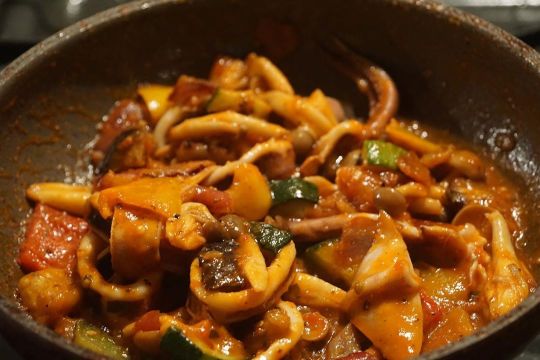
夕べは仕込みしつつpizzaも焼いて食べまんた #pizzamargherita #ヤリイカと夏野菜のトマト煮 https://www.instagram.com/p/CDBVHS-DAO4/?igshid=1hlz5v4xbrt9n
0 notes
Text
百无聊赖「百無聊賴」 bai3 wu2 liao2 lai4 bored to death, bored stiff, overcome with boredom
掀开 「掀開」 xian1 kai1 to lift open, to tear open
分说 「分說」 fen1 shuo1 to explain (the difference)
恰到好处 「恰到好處」 qiao4 dao4 hao3 chu4 it’s just perfect, it’s just right
辨析 bian4 xi1 to differentiate and analyze, to discriminate
义无反顾 「義無反顧」 yi4 wu2 fan3 gu4 honor does not allow one to glance back, duty-bound not to turn back, no surrender, to pursue justice with no second thoughts
潜移默化 「潛移默化」 qian2 yi2 mo4 hua4 imperceptible influence, to influence secretly
眼下 yan3 xia4 now, at present
字迹 「字跡」 zi4 ji4 handwriting
耸肩 「聳肩」 song3 jian1 to shrug one’s shoulders
#langblr#mandarin langblr#chinese langblr#polyglot#tongueblr#mandarin chinese#learn mandarin chinese#learn chinese#mine#m vocab
47 notes
·
View notes
Text
So I’ve been having a major crush on Bai Yu 百宇 ( I mean have you guys seen him and Zhu Yi Long in Guardian!). I watched the drama “Suddenly This Summer 匆而今夏”, which stars Bai Yu。 And I really like the song, “10:30 in Los Angeles (洛衫矶的十点半)”; I thought of making a vocab list for the song. One of things I like about this song is that except for little bits here and there, I can understand a large part of it by myself. You guys can give the song a listen here.
1. 轻声 qing1 sheng1 (adv) in a soft voice
2. 呢喃 ni2 nan2 (onomatopoeia, literary) whisper
3. 静止 jing4 zhi3 (v) motionless, still
4. 原望 yuan4 wang4 (n) desire, wish
5. 实现 shi2 xian4 (v) realize, fulfil
6. 交给 jiao1 gei3 (v) to give, hand over
7. 帧 zhen1 (m.w) measure word for a picture, frame...
8. 地址 di4 zhi3 (n) adress
9. 收 shou1 (v) receive, accept
10. 若 ruo4 (conj. literary) if
11. 天真 tian1 zhen1 (adj.) innocent
12. 走散 zou3 san4 (v) to get lost, wander off
13. 到达 dao4 da2 (v) to arrive
14. 承诺 cheng2 nuo4 (n, v) a promise, promise to do sth. The song uses a noun
15. 无声 wu2 sheng1 (adj) silent
16. 表达 biao3 da2 (v) express, to convey
17. 盯 ding1 (v) to stare at
18. 秒针 miao3 zhen1 (n) second hand of a watch/clock..
19. 嘀嗒 di1 da1 (onomatopoeia) ticking
20. 介意 jie1 yi1 (v) to take offence, to mind (usually negative)
21. 彼此 bi3 ci3 (pronoun) each other
22. 假装 jia3 zhuang1 (v) pretend
23. 从此 cong2 ci3 (adv) from now on
24. 埋 mai2 (v) to bury
42 notes
·
View notes
Text
Random phrases
From my most recent lesson with my tutor in which we learned vocab related to movies:
我没有听到你 - wo3 mei3 you3 ting1 dao4 ni3 (I didn’t hear you)
打扫 - da3 sao3 (to clean)
用了小时打扫 - yong4 le xiao3 shi2 da3 sao3 (used an hour to clean/spent an hour to clean)
上节课 - shang4 jie2 ke4 (last (previous) class)
类型 - lei4 xing2 (genre/type) -> 属的类型,电影类型,音乐类型 (genre of book (note: my teacher said that you need 的 when describing a book genre, but you don’t when describing other things that have genres), genre of movie, genre of music)
你喜欢什么类型男生?- ni3 xi3 huan1 shen2 me lei4 xing2 nan2 sheng1? (what type of guy do you like?) -> my teacher said you can also use 类型 to describe your type :D
地道 - di4 dao(no tone) (authentic) -> in response to the question above, I asked my teacher if you could also use “菜“ to describe your type, and she laughed/ looked really surprised and asked me how I knew that because it’s a very authentic way to say it. I was like “umm....I have friends who teach me fangirl slang” XD
句子 - ju4 zi(no tone) (sentence)
恐怖片 - kong3 bu4 pian1 (scary movie)
蛇 - she2 (snake)
鬼 - gui3 (ghost)
科学 - ke1 xue2 (science)
科幻片 - ke1 huan4 pian1 (science fiction movie)
卡通片 - ka4 tong1 pian1 (cartoon movie)
爱情片 - ai4 qing2 pian1 (romance movie) -> i.e. ”修炼爱情“ by JJ Lin
喜剧 - xi3 ju4 (comedy) -> note: my teacher said you don’t need 片 after this genre
电视剧 - dian4 shi4 ju4 (TV series)
动作片 - dong4 zuo4 pian1 (action movie) - i.e. 动 as in 运动
刚刚 - gang1 gang1 (just now)
黑帮片 - hei1 bang1 pian1 (gangster movie)
演员 - yan3 yuan2 (actor)
很少 - hen3 shao3 (not many) -> i.e. 很少中国人说/做。。。
还可以 - hai1 ke3 yi3 (ok/so-so) -> note: my teacher said that 马马虎虎 is a perfectly fine way to say “it’s okay/so-so” (which is what they taught us in college Chinese), but 还可以 is a more authentic/common way to say it
以后,你和朋友聊天,你可以聊电影 - yi3 hou1, ni3 he3 peng2 you3 liao3 tian1, ni3 ke3 yi3 liao3 dian4 ying3 (afterwards, you and your friends talk, you can talk about movies) -> note: I’d never seen 以后 used at the beginning of a sentence like this, but my teacher said in this context it just means afterwards/in the near future
会话 - hui4 hua4 (conversation)
打算 - da3 suan4 (plan)
上映 - shang4 ying4 (in the cinema, on screen)
邻居 - lin2 ju1 (neighbor)
大战 - da3 zhan4 (war) -> i.e. 星球大战 (Star Wars)
评分 - ping2 fen1 (rating) -> i.e. 这部 (bu4) 电影评分很高 (This movie’s rating is very high)
吓人 - xia4 ren2 (scary) ->note: different from 害怕。 i.e. 恐怖片太吓人了 (the scary movie is too scary) vs. 我害怕 (I am scared)
胆小 - dan3 xiao3 (coward) -> literally means “small gut” (like the saying “has no guts”)
超级 - chao1 ji2 (very, super) -> note: but to an even greater extent than 非常
词 - ci2 (word)
27 notes
·
View notes
